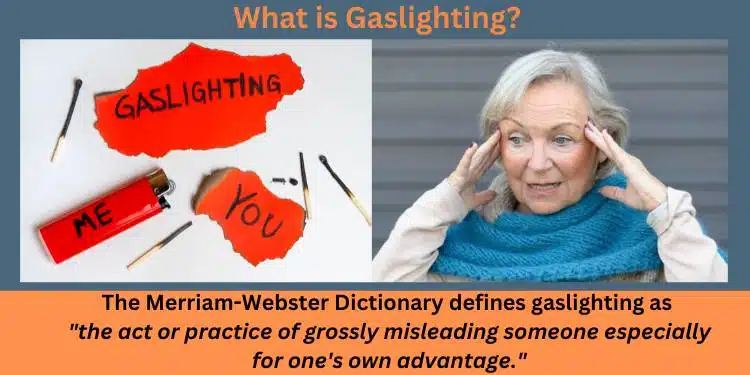by Mary Ellen Smyth
Are you in a relationship where the other person seems to distort reality to make you feel like your feelings or observations aren’t real? If so, you could be a victim of gaslighting. This form of abuse can come from a romantic partner, a boss, a family member, or anyone else who seeks to gain control over you by playing dangerous mind games.
You hear a lot about gaslighting between husband and wife. But it can happen in many other types of relationships too. I am currently experiencing gaslighting from a family member. He is generally a nice guy under normal circumstances but has some narcissistic tendencies and unreasonable expectations. Recently, this particular family member experienced some bad luck and now needs help, and the rest of our family members try to do what we can for him. However, he becomes mean and nasty when people disappoint him; in this case, “disappoint” means people don’t do exactly what he wants when he wants. He refuses to acknowledge there may be a reason the other person is not available to do what he says he needs, and rants about how everyone “always betrays him” and is “never there for him”. The reality is that when unable to meet his demands, we give suggestions related to what we can do to help, but unfortunately, that seems to enrage him. It’s his way or the highway. All or nothing.
When asking for help, this individual withholds information if we dare to ask questions. His requests are not simple and often require considerable time, effort, and sometimes money. It’s important to me that I fully understand the situation before I prioritize his needs over my own responsibilities to accommodate him. He ignores my questions, either by not responding at all or with an abrupt change of subject. Recently, when I realized much of what he told me differed significantly from what he told the family members with whom he lives, he forbade me to speak to them moving forward.
Gaslighting Definition
The Merriam-Webster Dictionary defines gaslighting as “the act or practice of grossly misleading someone especially for one’s own advantage.” Someone trying to gaslight you typically wants to confuse you and make you doubt yourself to make it more likely you’ll go along with what they want. Gaslighting is a popular term these days, used now more than ever. It’s interesting that, in this age of misinformation, “fake news”, conspiracy theories, etc., 2022 saw a 1740% increase in online searches for gaslighting, according to Miriam-Webster.
It took me a long time to realize this family member misled me for his own advantage on a frequent basis. I believed the negative things he said about others, and I let him isolate me from other people. I allowed him to manipulate me, put me down, and admonish me for not being there for him when he needed me. But the truth is, I care about him and have been there for him, many times. The same is true of other members of our family.
I wish I better understood this behavior earlier to avoid beating myself up for as long as I did. I didn’t see the signs and I should have as this type of behavior is not actually new for him. It was always there, but we saw this angry, self-centered, and irrational side only occasionally. It’s easy to overlook or explain away difficult behavior when it doesn’t happen all the time. Now that unpleasant behavior seems to have taken over.

What is Gaslighting and What Are the Signs?
As gaslighting is a form of psychological manipulation where a person works to make another person doubt their perception, memory, or reality, it’s important to recognize the signs. Only then can you protect yourself from its harmful effects. Here are some common signs that someone may be gaslighting you:
Denying the truth
The gaslighter consistently denies things they said or did, even when there is clear evidence to the contrary. They may claim you are imagining things or making them up.
Trivializing your feelings
Gaslighters may dismiss your feelings, making you feel like your emotions are irrational or exaggerated. They might say things like, “You’re too sensitive” or “You’re overreacting.”
Projecting
They often project their own negative behaviors or feelings onto you. They might accuse you of doing the things they are guilty of.
Withholding information
Gaslighters may withhold information or keep you in the dark about important matters, making you feel confused or dependent on them for information.
Shifting blame:
Abusers who gaslight avoid taking responsibility for their actions and instead blame you for their mistakes or bad behavior.
Playing the victim
They often portray themselves as the victim in situations where they are clearly the aggressor, making it difficult for you to confront them or hold them accountable.
Isolating you
Gaslighters may try to isolate you from friends and family, making you more dependent on them and less likely to receive support from others.
Using condescending or patronizing language
They might use language that makes you feel inferior or incompetent, undermining your self-esteem.
Constantly changing their story
Gaslighters frequently change their version of events, making it difficult for you to keep track of the truth.
Creating false narratives
Gaslighters may invent entirely false stories or scenarios and insist they are true, even when there’s no evidence to support their claims.
Undermining your memory
They might insist that you don’t remember things correctly, even if you have a strong memory of the events.
Gaslighting over time
Gaslighting tends to be a pattern of behavior that occurs over time, wearing down your confidence and making you doubt your own perception of reality.
People who engage in gaslighting do not necessarily exhibit all these signs at all times. Gaslighting behaviors can vary in intensity and frequency, and not all gaslighters will display every characteristic associated with this manipulative behavior. The specific signs and tactics used depend on their personality, motivations, and the dynamics of the relationship. It’s important to recognize that the absence of some signs doesn’t make the behavior any less harmful or manipulative.

Examples of Gaslighting
Here are some examples of statements and phrases commonly used by gaslighters:
“You’re too sensitive”
This is a common one. It is an attempt to trivialize your feelings and make you question your emotions.
“If you really loved me, you would …”
People who gaslight use this phrase to make people feel guilty when you don’t do what they want. This phrase is frequently used by gaslighters if you question them.
“I remember you agreed to do that.”
Replacing your memories with theirs is a hallmark red flag of gaslighting. These people are often exceptionally convincing, causing you to believe you did actually say or do something you didn’t. They will hold it over your head that they can’t trust you.
“I never said that.”
Gaslighters often deny things they said (or did), even when you have clear evidence.
“You’re overreacting” or “You’re making a big deal out of nothing.”
A gaslighter wants to minimize your concerns and make you doubt the legitimacy of your reaction.
“You’re a terrible partner/parent/sibling/friend.”
Gaslighters use personal attacks to weaken your self-worth.
“You always do this” or “You never do that.”
This is an attempt to generalize your behavior and make you question your consistency.
“You’re the one who’s wrong.”
Gaslighters will frequently shift the blame to make you feel responsible for their actions.
These statements are designed to make you doubt yourself, question your perception of reality, and ultimately, in severe cases, feel dependent on the gaslighter. It’s important to recognize these tactics and seek support from trusted friends, family, or a mental health professional if you believe you’re experiencing gaslighting.
Why Do People Gaslight?
People engage in gaslighting for various complex reasons, often rooted in their own emotional and psychological issues. One significant motive is the desire for control. Gaslighters use this manipulative behavior to maintain dominance over their victims by eroding their self-confidence and making them doubt their own perceptions and reality. This control can serve their own interests, allowing them to steer situations in their favor or evade responsibility for their actions.
Another common driver of gaslighting is insecurity. Individuals who feel deeply inadequate or insecure may use gaslighting as a means to elevate their own self-esteem at the expense of their victims. By making others feel inferior or unstable, gaslighters temporarily bolster their fragile self-image, attempting to shift the focus away from their own insecurities. These underlying motivations can manifest in various ways. Often gaslighting can cause significant emotional harm to the victim while fulfilling the gaslighter’s psychological needs for control and validation.

Are People Who Gaslight Conscious They Are Doing It?
Good question. Whether or not the person engaging in the gaslighting behavior is aware of their actions can vary depending on the situation. Here are a few different scenarios to consider:
Conscious Gaslighting: In some cases, individuals may intentionally and consciously engage in gaslighting behavior. They are fully aware of what they are doing and use it as a manipulative tactic to gain control, power, or to cover up their own actions. These individuals are deliberately trying to make the other person doubt themselves.
Unconscious Gaslighting: Some people may engage in gaslighting without fully realizing what they are doing. They may exhibit behaviors or patterns of communication that make the other person feel confused, manipulated, or doubtful, but they might not be doing it with a clear intention to gaslight. In these cases, the gaslighter may be repeating behaviors they learned or developed over time without a full understanding of the impact.
Situational Gaslighting: Gaslighting can also occur in specific situations or relationships where emotions are heightened, and individuals may say or do things they wouldn’t do under normal circumstances. They may not consciously plan to gaslight but engage in this behavior during arguments, conflicts, or times of stress.
Narcissistic Personality Disorder: Some individuals with narcissistic personality disorder sometimes engage in gaslighting as a part of their personality and manipulation style. They may do this as a defense mechanism to protect their self-esteem and manipulate others to maintain control. In such cases, gaslighting can be a more ingrained and consistent behavior.
In a nutshell, gaslighting may be calculated and intentional, but in other cases, it may be more subconscious or situational. I believe in the case of my family member that gaslighting is both unconscious and situational. Regardless of the intentions, though, gaslighting is often harmful and manipulative. It’s important to recognize the behavior and address it in relationships or situations where it occurs.

How to Respond to Gaslighting?
Responding to gaslighting is a challenge, but there are strategies to help you deal with this manipulative behavior while protecting your well-being. If you suspect someone is gaslighting you or using manipulative tactics, it’s crucial to trust your instincts, be aware of the signs you observe, and seek support to deal with the situation and protect your well-being. Here are some tips on how to respond when someone gaslights you:
Recognize the behavior.
The first step is to be aware of the gaslighting. Understand that the other person is attempting to manipulate your perception of reality and emotions.
Trust your instincts.
Believe in your own feelings and experiences. If something doesn’t feel right, acknowledge it, even if the gaslighter tries to make you doubt yourself.
Stay calm and composed.
Gaslighters may use emotional tactics to provoke a reaction from you. Maintaining your composure can be a powerful response. Responding with anger or defensiveness can often play into their hands.
Focus on actions, not words.
A gaslighter may sometimes tell you what you want to hear to keep you in the relationship. Don’t forget, no matter how sincere they seem, that their words are meaningless if their behaviors don’t change as well.
Remind yourself you are not the reason for a gaslighter’s abuse.
The abusive behavior was not your fault. It was about the gaslighter’s attempts to control and manipulate you. There is nothing you could or should have done differently to avoid being gaslit.
Set boundaries.
Establish clear boundaries and communicate your limits. Let the gaslighter know that you won’t tolerate their manipulative behavior.
Seek support.
Talk to friends, family members, or, if the situation warrants, a therapist about the situation. Sharing your experiences with trusted individuals can help you gain perspective and validation.
Confront the behavior.
If you feel safe doing so, calmly confront the gaslighter about their behavior. Use “I” statements to express how their actions are affecting you. For example, say, “I feel hurt when you deny what you said.”
Avoid engaging in arguments.
Gaslighters often try to draw you into circular arguments. Refuse to engage in these debates, as it’s unlikely to lead to a productive resolution. Gaslighting is not a rational behavior and gaslighters do not respond to logic or admit their true motivation.
Consider your options.
Depending on the severity of the gaslighting and the nature of the relationship, you may need to evaluate whether it’s healthy to continue the relationship. Sometimes, distance or ending the relationship is necessary for your well-being.
Self-care.
Prioritize self-care and self-compassion. Gaslighting can take an emotional toll, so engage in activities that nurture your mental and emotional health.
Keep in mind that you cannot change the gaslighter’s behavior, only your response. You need to protect yourself. Prioritizing your well-being and setting healthy boundaries is essential when dealing with this type of behavior.
The Bottom Line
If you suspect someone is gaslighting you or using manipulative tactics, it’s crucial to trust your instincts, be aware of the signs you observe, and seek support to deal with the situation and protect your well-being.
Regarding the situation with my family member, I wish I could say our relationship is better, but it’s not. I learned to set clear boundaries to protect myself and the result is that he rarely speaks to me these days. However, I continue to offer to help in ways I am able, as I feel badly that he is having a tough time and do think he could use some help. Unfortunately, he will not accept any of it unless I agree to fully meet his unrealistic demands. Since this person is family, I do not want to completely sever the relationship, and I do feel bad that he is having a tough time right now. For that reason, I call or text regularly letting him know I am here for him in my own way. He does not respond, and that’s O.K. It’s his choice. All I can do on my end is try.

FAQs About Gaslighting
Below are some frequently asked questions we hear from our readers about gaslighting.
What is gaslighting?
Gaslighting is a form of psychological manipulation in which a person seeks to make another person doubt their perception, memory, or reality. It often involves tactics to undermine a person’s confidence and sense of reality.
What are the signs of gaslighting?
Signs of gaslighting include denial of the truth, trivializing your feelings, projecting their flaws onto you, shifting blame, changing their story, questioning your memory, using condescending language, and more. It’s a pattern of behavior meant to control and manipulate.
Why do people gaslight?
People engage in gaslighting for various reasons, including a desire for control, insecurity, manipulation, avoiding accountability, narcissism, and more. Gaslighting is often driven by the gaslighter’s own emotional and psychological issues.
How can I respond to gaslighting?
Responding to gaslighting involves recognizing the behavior, setting boundaries, seeking support from trusted individuals, staying calm and composed, and considering professional help if necessary. Self-care and self-compassion are also important.
Is gaslighting a form of abuse?
Absolutely. Gaslighting is considered a form of emotional and psychological abuse. It can be damaging to the victim’s mental and emotional well-being over time.
Can gaslighting happen in personal relationships or at work?
Gaslighting can occur in both personal and professional relationships. It’s not limited to romantic partners; it can happen among friends, family members, coworkers, and even in group settings.
Is it possible to change a gaslighter’s behavior?
Changing a gaslighter’s behavior is challenging, as they often resist accountability. In some cases, therapy or professional intervention may help, but it depends on the willingness of the gaslighter to change.
How can I protect myself from gaslighting?
Protecting yourself from gaslighting involves setting boundaries, seeking support, and, in some cases, distancing yourself from the gaslighter. Self-awareness and self-esteem building can also be helpful.










